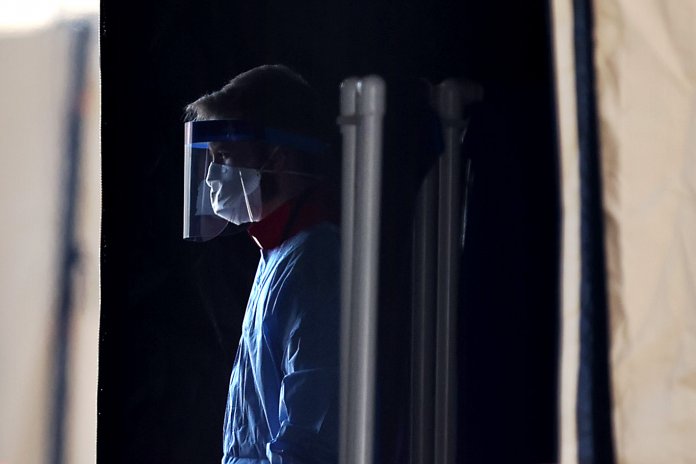VM – A group of 19 Virginia medical associations sent a letter to Gov.
Ralph Northam recently, requesting legal protections for their response to
the COVID-19 pandemic.
The letter, signed by such major industry players as the Medical Society
of Virginia and Virginia Hospital and Healthcare Association, includes a
draft executive order and calls on Northam to declare “civil and
criminal immunity to health care providers that act in good faith” while
responding to the outbreak.
“Despite our collective good faith and exhaustive efforts and a number
of environmental factors that are outside of our control, we have seen a
marked increase among the legal community discussing and advertising the
possibility of tort litigation for our response to the COVID-19
pandemic,” it reads.
Dr. Clifford Deal, president of the Medical Society of the Virginia, said
the request was intended to clarify existing state statutes that have
largely remained unlitigated. Virginia code extends certain liability
protection — excluding “gross negligence or willful misconduct — to
medical providers during disasters and emergencies. Another section of
code extends civil liability protection to hospitals and credentialing
agencies during the same circumstances.
But because the current pandemic is so unusual, there’s no legal
precedent in Virginia establishing that COVID-19 — the disease caused by
a new coronavirus — counts as a “disaster,” Deal said. The letter
requests Northam to unequivocally declare that the state’s current
protections extend to the pandemic, and to clarify that assisted living
facilities, adult day centers, home care and hospice services would have
the same protections as other medical providers.
“We’re talking about something that hasn’t happened in a century,”
Deal said, comparing the spread of COVID-19 to the Spanish flu pandemic.
“There was no medical malpractice in 1918.”
Multiple states, including New Jersey, Tennessee and Michigan, have issued
similar executive orders in response to the pandemic, said Elliott
Buckner, president of the Virginia Trial Lawyers Association. VTLA helped
draft the potential executive order, adding an end date of June 10 —
when Northam’s declared state of emergency is scheduled to expire.
As coronavirus case numbers continue to rise in Virginia and across the
country, doctors and other providers are being placed in unprecedented
situations. When it comes to COVID-19 care, some physicians are forced to
go without personal protective equipment, or — in especially agonizing
cases — make decisions on which patients receive ventilator support,
said Clark Barrineau, the assistant vice president of government affairs
for MSV.
Hospitals in Virginia are currently using only 26 percent of available
ventilators, according to data from the Virginia Hospital and Healthcare
Association. But physicians across the state are still considering how to
handle a surge in cases, which could also require some doctors to work
outside their normal specialties, Barrineau said.
Outside acute care settings, providers are still operating “in ways
they’ve never had to before,” Deal added.
“You have pediatricians in some cases walking out to cars to give
vaccines to three-year-olds,” he said.
Many surgeries have also been postponed except in life-threatening
situations. Deal, a breast cancer surgery specialist, said even
lumpectomies have been rescheduled during the pandemic to conserve
personal protective equipment and reduce the risk of exposing patients to
coronavirus at the hospital.
Providers are trying to ensure they can’t be sued for measures taken
under extraordinary circumstances, Barrineau said. In a statement provided
to the Mercury on Thursday, Northam’s spokeswoman, Alena Yarmosky, said
the governor is “tremendously grateful for Virginia’s heroic
healthcare workers” and “will continue to consider all available
options to support these critical providers.”
Joshua Silverman, a personal injury attorney in Richmond whose
specialities include medical malpractice and nursing home abuse cases, was
more skeptical about whether providers need special immunity during the
COVID-19 pandemic. The current outbreak is an extraordinary circumstance,
he acknowledged, which could make it less — not more — likely for
lawyers to accept lawsuits against doctors.
“If anything, I’m hearing kind of the opposite — that attorneys are
very ambivalent about taking cases with any relation to COVID-19,” he
said. The reluctance could be tied to multiple factors, including an
unwillingness to be seen as “picking on health care providers,”
Silverman said, and the difficulty of proving liability.
“You need to prove that A: the health care provider acted unreasonably.
And B: that was the cause of the injury or death,” he continued. “I
think that’s going to be challenging because how do you know that doing
X, Y, or Z was the cause of the infection or the cause of worsening the
infection?”
Expanding immunity for medical providers could also hurt patients,
Silverman said. While the existing statutes wouldn’t exempt
practitioners in cases of gross negligence or willful misconduct, they
could protect them in cases of ordinary negligence.
Most people understand that providers are being forced to act under
extraordinary circumstances, making them less likely to need greater
protections, he added.
“I just don’t see this being necessary if health care providers are
acting reasonably under the circumstances,” Silverman said. “If
they’re acting reasonably under the circumstances, they should be fine.
If they’re not acting reasonably under the circumstances, then that’s
negligence. And like all of us, they should be held accountable for their
negligence.”



